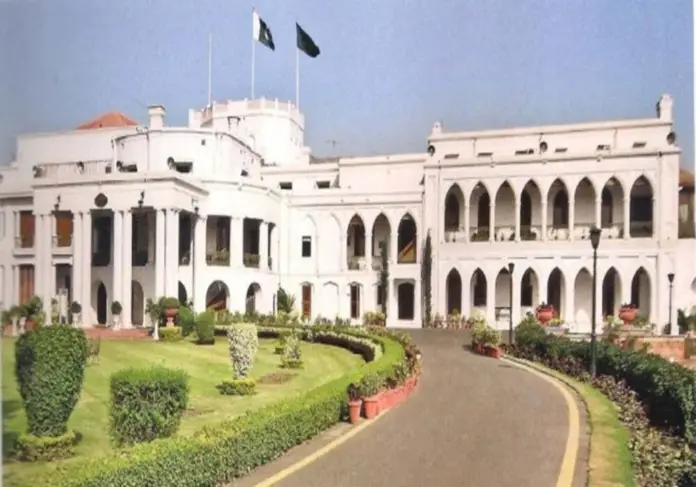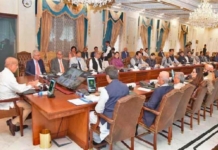The political uncertainty in the country has badly tarnished the trend of transparency the Pakistan Tehreek-i-Insaf (PTI) government had nurtured for long.
The bureaucracy has gone slow while noticing the changing tone of the background music.
Questions arise regarding the chief executive as well. Prime Minister Imran Khan should come forward to probe the allegations to shatter the clouds of doubt.
Reportedly, a lot of official records have been wasted or shifted to an unknown place from the chief minister’s office. As per reports, a lot of funds to the tune of Rs80 to Rs90 crore specified for different schemes have been transferred to favour people from the hometown. Moreover, favours to the people of the ‘top-hometown’ from the discretionary funds have been reportedly granted. However, the government spokesperson denies such news as baseless propaganda against the PTI government in the province. On the other hand, it confirmed that about Rs8 crore were given to the needy. Why this act of financially favouring people of an area was kept secret and made public when news surfaced?
A finance department officer on the condition of anonymity said that it had been a common practice to grant money from the discretionary funds of the CM to widows and the needy, etc.
The chief minister is not only a custodian to the public exchequer but also the record of the departments. As per the Transparency and Right to Information Act 2013 (RTI), there was a dire need to place the information on the official website. Why the CM office could not act according to the law to ensure all the records on its website are open to the public? Secretary to CM Amir Jan didn’t respond to queries on the subject. Punjab government’s spokesman Hassan Khawar could not be reached for his stance either.
However, the common practice goes against record keeping. Instead of making the data public to shun the muggy reports as the government alleges, the government has started probing to know who leaked the information to the media. This act, if true, also goes against the spirit of the RTI Act 2013.
It is a universal phenomenon and law in many countries to protect whistleblowers. The law protects the person who was found involved in leaking any type of information. “If an official could not negate any illegal act ordered or desired by his boss fearing consequences, he may leak the information to protect the public interest for which he was paid from the exchequer,” said an official of the CM office. He believed that such acts in the civilised world are deemed heroic and applauded. However, here they appear as an offence.
As the political tenure nears its completion, the need is to make all such acts or orders passed by the CM public. Otherwise, the party would have to bear the brunt of it.
People question that there was no change in police, revenue, courts, and other cultures. Offices are no-go areas. Why the CM has centralised all powers? Why there is a general ban on officers’ transfers? Why summary is needed for all acts? Why Civil Secretariat has become a musical club of transfers.
The ‘power house’ has to face the consequences of monetary, and administrative powers.
The inefficiency and counter-productiveness of the public sector demand its surgery. The surgeons have no time to fix the problem.
Meanwhile, the issue of earmarking a 32 percent quota for South Punjab may leave a long-lasting effect on the future of the new generation.
Though, the government has postponed a meeting to validate the proposal of a 32 percent quota for southern Punjab citizens in government jobs. Either amendment in the relevant act or its promulgation through an ordinance could be the possible way forward.
Moreover, to create South Punjab province, a bill has been tabled in the National Assembly, though the first step was of establishing South Punjab Secretariat. The officers posted in that have been drawing extra monetary benefits as compared to the main secretariat Lahore.
Dr. Arshad Ali, while talking about the job quota, said, “There should be a commission constituted to justify eligibility of 32 percent quota. The commission, after analyzing data from the Punjab Public Service Commission, demography, employment rate and education index of different districts should decide whether there was a need for a quota or not.”
This is not true that on just the wishes of the chief executive, a committee comprising almost all the elected members from South Punjab recommended a certain quota. This would go against the party position in the rest of the province.
Dr. Arshad also suggested studying and consulting what the constitution of Pakistan says on the issue of quota. Moreover, the commission should also study which of the areas are underrepresented in jobs, education and other development areas. The news data and political claims have stated that a ring-fenced budget was allocated for the said ‘backward’ area. Also, funds from other sectors as reported are also spent on the region. Officers say Taunsa civil secretariat was more effective than the Multan or Bahawalpur secretariats.
The current political scenario of the country and province both reflect that things are not running smoothly. The uncertainty has led to administrative failure in the province.
The political uncertainty has led to the cancellation of some important meetings such as those on the South Punjab job quota and the weekly administrative secretaries meeting has also been postponed.
The junior ministerial staff working in the Civil Secretariat has also started observing a pen-down strike. They raised slogans against the top office-bearers to raise their allowances despite them already drawing it. They demand to increase their secretariat allowance from fifty percent to 100.
Meanwhile, college teachers’ blocking of the Lower Mall has entered the fourth week. They have permanently blocked the VIP gate the chief secretary and the chief minister use to enter or exit the government headquarters.
They demand the regularisation of services of around 7,000 teachers. They want pay protection as well.
The participants are absent from their teaching institutions while others present there are boycotting classes daily for one hour. They also threaten to completely boycott the classes if authorities didn’t accept their demands. Where is the writ of the government? Where are the conduct rules for interrupting public order, blocking roads and disturbing public order by none but the teaching community? Is there any difference between the way of clerks and respected teachers? Who will look after the educational interests of already ignored students studying in government colleges? Who will question the deteriorating and declining standards of the government colleges? The trend of surrendering to acts of such pressure groups would further add to the already inefficient public sector with low service delivery.
Asghar Ali Advocate, while talking on service matters, said that while joining government jobs, all the employees signed an agreement. He said that there should be a strict policy to regularise services of the contractual employees. “If this is their attitude as temporary employees, what will they do after getting regularised?” Ali questioned.
They should quit if they thought that they were not being given as much as they demanded, he said, adding that the act of disturbing common people to pressurise the government to meet their demands was not justified. He said that the government should act according to disciplinary laws against such employees. The unionism and political culture within departments have destroyed work culture. They have made them their safe dens.
Neither the CM office nor the Civil Secretariat ever devised a strategy to handle the protesters who leave workplaces and reach the capital bag and baggage. Who cares for the losses, the sufferings and the system as all are getting perks and privileges. Punjab Chief Secretary Kamran Ali Afzal should plan how to deal with the protesting officials. CS Afzal should ensure service delivery and the presence of officials in workplaces. The commissioner of the division should be answerable if its employees reach and block roads of the metropolis.
The CS should also go for whistleblowers law and initiate proceedings under the much-trumpeted directory retirement policy. Otherwise, these undue strikes and protests will continue unabated.
The Punjab government should also learn from Pakistan Railways. Its pension bill of Rs3 billion has crossed the regular salaries of the department. There should be regular appointments in departments that are profitable or at least maintain their expenses or have service delivery of multi-national organisations. Otherwise, hire only project-based employees. There should be a salary and allowances linked to performance. Rather, the taxpayers will be paying the salaries, perks and pensions in the upcoming decade, as a federal finance secretary has warned.
The PTI government could not initiate a probe into fixing responsibility for a severe shortage of irrigation water in dams. Moreover, the government should also share its plan as to how to tackle the issue of shortage of irrigation water in the dry season.







